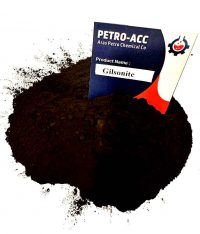Gilsonite uses in cementing is one of its main applications. Gilsonite, also known as natural asphalt or uintaite, can be used as a key component in cementing applications. Here are some of the ways Gilsonite can be used in cementing:
- Enhancing Cement Properties: Gilsonite is a naturally occurring hydrocarbon that has unique properties, including high softening point, excellent adhesion, and chemical resistance. As a result, Gilsonite can enhance the properties of cement, such as increasing its compressive strength, reducing permeability, and improving durability.
- Cement Additive: Gilsonite can be used as an additive in cement to improve its workability, increase setting time, and reduce water loss. It can also improve the cement’s bonding to different surfaces, such as metal and rock.
- Lost Circulation Control: Lost circulation occurs when drilling fluid flows into fractures or porous zones, leading to a loss of fluid and an increase in drilling costs. Gilsonite can be used as a lost circulation control additive in cement to seal these fractures and porous zones, preventing further fluid loss.
- Wellbore Stability: During drilling, the wellbore can become unstable due to the high-pressure environment, leading to the collapse of the wellbore walls. Gilsonite can be used in cement to increase its strength and prevent wellbore instability.
Overall, Gilsonite can be a useful component in cementing applications due to its unique properties and ability to improve the performance of cement.
BENEFITS OF USING GILSONITE IN CEMENTING
Here are some of the benefits of using Gilsonite in cementing:
- Improved fluid loss control: Gilsonite has excellent fluid loss control properties, which help in reducing the amount of fluid lost to the formation during cementing. This helps in achieving a good cement bond with the formation and reduces the risk of cement channeling.
- Increased compressive strength: Gilsonite has been shown to improve the compressive strength of cement. This is due to its ability to fill in the micro-fractures in the cement matrix, which leads to a denser and stronger cement bond.
- Reduced permeability: Gilsonite can also reduce the permeability of the cement, which makes it more resistant to fluid flow. This is particularly useful in applications where the cement is exposed to harsh fluids, such as brine or acid.
- Improved rheology: Gilsonite can improve the rheological properties of the cement slurry, making it easier to pump and place. This is particularly useful in challenging wellbore conditions, such as narrow annuli or high-angle wells.
- Cost-effective: Gilsonite is a cost-effective additive for cementing, as it can be used in small quantities to achieve significant improvements in cement performance.
Overall, the use of Gilsonite in cementing can lead to improved wellbore integrity, reduced risk of cement failure, and increased production rates, making it a valuable addition to the cementing process.
METHODS OF USING GILSONITE IN CEMENTING
Here are a few methods of using Gilsonite in cementing:
- As a cement additive: Gilsonite can be added to cement slurries to improve their properties. It can be used as a partial or complete replacement for Portland cement to enhance its performance of the cement. The addition of Gilsonite to the cement slurry can improve the compressive strength, tensile strength, and elasticity of the cement.
- As a lost circulation material: Gilsonite can be used as a lost circulation material to prevent the loss of drilling fluids into the formation during cementing. It can be added to the cement slurry in concentrations ranging from 1 to 10% by weight to control the loss of fluid.
- As a shale inhibitor: Gilsonite can also be used as a shale inhibitor to prevent the swelling and dispersion of shale formations during cementing. It can be added to the cement slurry in concentrations ranging from 1 to 10% by weight to inhibit the swelling and dispersion of shale.
- As a fluid loss control agent: Gilsonite can be used as a fluid loss control agent to reduce the rate of fluid loss from the cement slurry. It can be added to the cement slurry in concentrations ranging from 1 to 5% by weight to control the fluid loss.
- As a rheology modifier: Gilsonite can be used as a rheology modifier to improve the flow properties of the cement slurry. It can be added to the cement slurry in concentrations ranging from 1 to 5% by weight to modify the rheology of the slurry.
It is important to note that the concentration of Gilsonite added to the cement slurry depends on the desired properties and the specific application. Therefore, it is recommended to consult with a qualified engineer or specialist to determine the appropriate concentration of Gilsonite to be used in cementing operations.
HOW GILSONITE WILL DECREASE CEMENTING COSTS
When it is added to cementing slurries, Gilsonite can help decrease cementing costs in several ways:
- Reduce water demand: Gilsonite has the ability to reduce the amount of water needed in cementing slurries, which in turn reduces the overall cost of the slurry. This is because water is often the most expensive component of a cement slurry, and by reducing its demand, the cost of the slurry can be significantly decreased.
- Increase compressive strength: Gilsonite has been found to improve the compressive strength of cement slurries. This means that less cement may be required to achieve the desired strength, resulting in cost savings.
- Improve cement bonding: Gilsonite can improve the bonding between the cement and the formation, reducing the risk of a poor cement bond that could lead to well integrity issues. This improves the effectiveness of the cementing operation, reducing the need for remedial work, which can be costly.
- Reduce slurry density: Gilsonite has a lower density than many other additives used in cementing slurries, so it can be used to reduce the density of the slurry without compromising its performance. This can result in cost savings by reducing the amount of cement needed to achieve the desired density.
In summary, by reducing water demand, increasing compressive strength, improving cement bonding, and reducing slurry density, Gilsonite can help decrease cementing costs in the oil and gas industry.









Leave A Comment